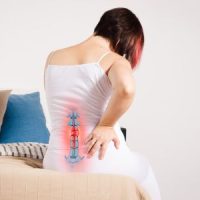Did You Suffer Spinal Disc Herniation In An Accident?

Referred to by a wide range of names, including bulging discs, slipped discs, ruptured discs, or protruding discs, herniated spinal discs are extremely painful, but relatively common accident-related injuries. Unfortunately, with so many different names, there is often confusion surrounding this type of injury. Having a thorough understanding of these injuries can be beneficial when seeking damages after an accident.
How Disc Herniation Occurs
A spinal disc herniation occurs when the outer wall of the soft cushions (spinal disc) that are located between the spinal vertebrae rupture, pushing a portion of the disc’s inner gel outwards against the spinal cord and spinal nerves. This process is known as protrusion. Disc protrusions are often referred to as bulging discs because, while the discs and ligaments remain intact, they form a pouch that pushes against the spinal nerves. Once the disc actually ruptures and the inner, gelatinous part of the disc starts to push through the wall and leak out, however, the injury is considered an extrusion. Both protrusion and extrusion can cause devastating pain, including:
- Sciatica, which occurs when pressure from the damaged disc presses on the sciatic nerve, causing an ache or shooting pain into the buttocks and down the back of the leg;
- Numbness, tingling, and generalized weakness in the area; and
- Paresthesia, which involves a tingling, prickling, or numbing sensation.
What Causes Disc Herniation?
Herniated discs can occur in a variety of traumatic accidents, including car crashes and slip and fall accidents. Whatever the cause, they are almost always excruciatingly painful due to the sensitive nature of the nerves in the spinal cord. Unfortunately, injuries to the musculoskeletal system often prove to be permanent, so while there are treatments that can mitigate pain symptoms, it is not uncommon for injured parties to never return to their pre-injury level of health.
Diagnosing and Treating Herniated Discs
To diagnose a herniated disc, a person will need to undergo an x-ray, CT scan, or MRI. These scans create a clear image of the disc, while an electromyography (EMG) can help locate the nerve on which the disc is pressing. Once diagnosed, a herniated disc will require individualized treatment and pain management. Most medical professionals start with conservative treatments, like rest, anti-inflammatory medications, ice and/or heat, physical therapy, massage, acupuncture, and narcotic pain medications. If pain persists, a person could require epidural or nerve block injections and eventually need surgical intervention to slow down neurological deterioration and give the nerve time to recover.
Schedule a Free Case Review Today
Back injuries tend to impact every facet of a person’s life, from their physical and mental health to their personal relationships and finances. If you suffered a herniated disc in an accident and your mobility has been compromised, or you are suffering from chronic pain, you need a reliable spinal cord injury attorney to handle your claim. Call Boone & Davis at 954-566-9919 to set up a free consultation with one of our dedicated Fort Lauderdale spinal cord injury lawyers, or send us an online message today.
Sources:
mayoclinic.org/diseases-conditions/herniated-disk/symptoms-causes/syc-20354095
aans.org/en/Patients/Neurosurgical-Conditions-and-Treatments/Herniated-Disc
